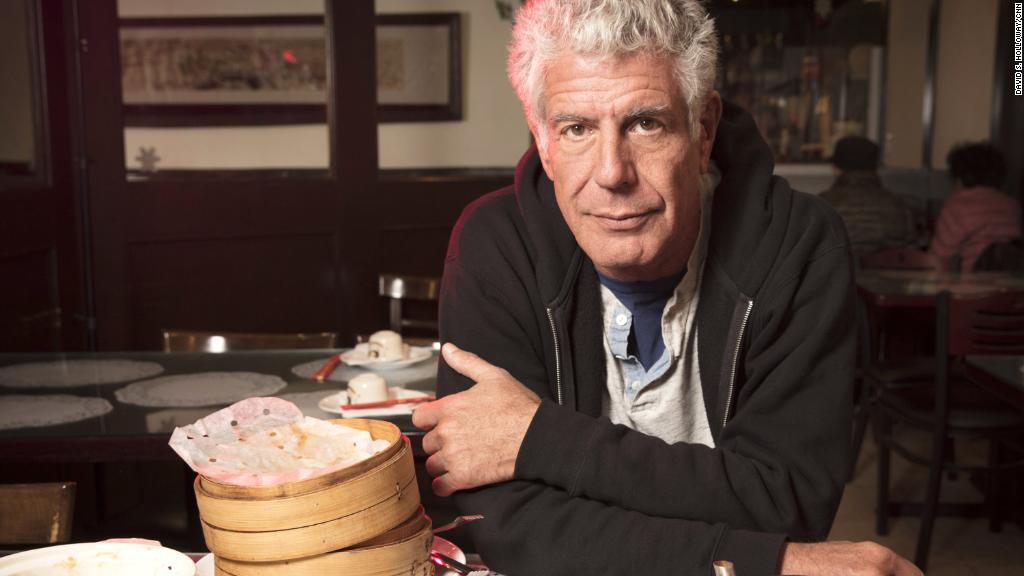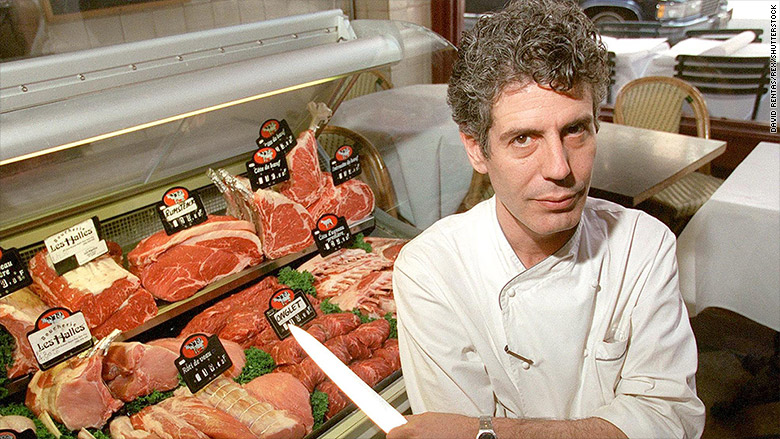
Anthony Bourdain went from dishwasher to globe-trotting storyteller.
He shared noodles and beer with President Barack Obama in Vietnam, won accolades exploring the world and its tastes, and built a business out of his legendary palette. His body of work was as expansive as his appetite.
His book "Kitchen Confidential: Adventures in the Culinary Underbelly," published in 2000, was translated into more than two dozen languages. He produced a travel journal, three crime novels, a cookbook, a biography of Typhoid Mary, and a graphic novel. His shows took him to more than 100 countries and aired on three networks.
Bourdain took his own life at age 61, CNN said Friday.
From angry kid to happy dishwasher
He worked his first job in a kitchen at age 13, growing up in Leonia, New Jersey.
"It was really a big event for me because, up to that point, I was lazy," Bourdain said in a 2016 interview on NPR's "Fresh Air." "I was an angry kid."
Bourdain found meaning in the disciplined structure of the work. "I was a happy dishwasher. I jokingly say that I learned every important lesson, all the most important lessons of my life, as a dishwasher."
He attended Vassar College in New York for two years, then dropped out and enrolled in culinary school. For years, he worked as a line cook and sous chef at restaurants in the Northeast before landing a job as executive chef at Brasserie Les Halles, in Manhattan.
A best-seller that 'changed everything'
Bourdain's big break didn't come with a novelty dish or rapturous reviews of his food.
Instead, he caught widespread public attention with "Don't Eat Before Reading This," a piece he wrote for The New Yorker in 1999 about the secrets of life in the kitchen and the shady characters he encountered along the way.
How to get help: Call the National Suicide Prevention Lifeline at 1-800-273-8255.
"I came into the business when cooks still smoked on the line and wore headbands," Bourdain wrote. "In America, the professional kitchen is the last refuge of the misfit. It's a place for people with bad pasts to find a new family."
The article led to a book deal. "Kitchen Confidential" became a best-seller and launched Bourdain into a new career.
"When the book came out, it very quickly transformed my life — I mean, changed everything," he told NPR.

Panio Gianopoulos, who edited the book for Bloomsbury, recalled receiving draft chapters from Bourdain.
"They would come in and they were so candid and brutally funny. The voice was so polished and yet so raw — this strange paradox," Gianopoulos told CNNMoney. "It felt like I was sitting at the bar while he was riffing to fellow cooks after a particularity brutal dinner shift."
Gianopoulos remembered walking into a colleague's office and saying, "If we can't make this a best-seller, we don't deserve to work in this industry."
Celebrity chef and cultural ambassador
"Kitchen Confidential" and his second book, "A Cook's Tour," helped Bourdain make the transition to television.
Food Network developed "A Cook's Tour" into a TV series of the same name. It ran for two seasons, in 2002 and 2003.
"From the get-go, Tony was very real," said Liane Thompson, the executive producer. "It wasn't about him. It was about what could be discovered. Tony wanted that to come through food."
She attributed Bourdain's success to his ability to connect with people in the places he visited.
Bourdain then moved to the Travel Channel as the star of "Anthony Bourdain: No Reservations," which debuted in 2005. "No Reservations" was a breakout hit, earning two Emmy Awards and more than a dozen nominations over nine seasons.
The shows shared an indelible style: Bourdain took his viewers to far corners of the world and used food to tell stories about culture and identity. He broke the mold of a celebrity TV chef, becoming a versatile correspondent sharing first-person accounts of exotic cuisines and foreign lands.
Bourdain was also a television producer. His recent documentary films included "Wasted! The Story of Food Waste" and "Jeremiah Tower: The Last Magnificent," about a pioneering chief. He was also an executive producer for CNN's documentary series "Christiane Amanpour: Sex & Love Around the World."
"Tony changed the food media landscape," said Ed Levine, a former New York Times contributor and the founder of SeriousEats.com. "He introduced humanity and real emotion and poetry into food storytelling. His voice is irreplaceable."
CNN took a risk by bringing him to a news network to create a documentary series that examined cuisines, both around the world and in the United States, from Bourdain's distinctive cultural viewpoint.
The late David Carr, a media critic for The New York Times, wrote of the hiring: "Given his track record, chances are high that Mr. Bourdain's run of luck will continue, but we will have to wait to find out if that good fortune will also smile on CNN."
It did. Bourdain quickly became a face of the network, helping it expand beyond headlines to culture and documentary series. "Anthony Bourdain: Parts Unknown" premiered in 2013 and won five Emmy Awards and a Peabody Award.
The 11th season of "Parts Unknown" premiered in April. The lineup of destinations was vintage Bourdain: Uruguay, Armenia, Bhutan, Newfoundland and West Virginia, among others.
In a video for "Explore Parts Unknown," a digital partnership between Bourdain, CNN and the travel site Roads & Kingdoms, Bourdain once reflected on the demands of what he had built.
He talked about traveling more than 200 days a year, the double-edged sword of celebrity and the balance of being true to your voice without selling out.
In a philosophical turn, he gently mocked himself. Believing you have something to say to a television camera or in a book, he said, is "aberrant behavior."
"To believe something so unreasonable as, 'I have an interesting story to tell that total strangers will be interested in spending hours following. That ain't normal."
Still, he said: "I do have the best job in the world. Who am I going to complain to? The boss? That's me."
— CNN's Brian Stelter contributed to this story.
Asking for help
The suicide rate in the United States has seen sharp increases in recent years. It's now the 10th leading cause of death in the country, according to the American Foundation for Suicide Prevention. Studies have shown that the risk of suicide declines sharply when people call the national suicide hotline: 1-800-273-TALK
There is also a crisis text line.
The lines are staffed by a mix of paid professionals and unpaid volunteers trained in crisis and suicide intervention. The confidential environment, the 24-hour accessibility, a caller's ability to hang up at any time and the person-centered care have helped its success, advocates say.


